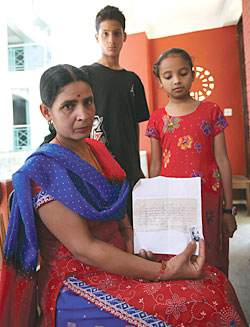 KIRAN PANDAY |
The issue of justice and impunity is once more in the headlines because of the promotion of Toran Bahadur Singh, the in-charge of the infamous Bhairabnath base, and the army's attempt to prevent Niranjan Basnet from appearing in a civilian court.
Such blatant attempts to obstruct the path of justice have significantly weakened Nepal's human rights movement and have also given the Maoists an excuse to get away with their own abuses. The issue of transitional justice and truth has become a charade.
Government bodies and human rights groups currently dealing with missing persons also display a lack of seriousness regarding justice for the affected families. Perpetrators of war crimes, far from being punished, are being rewarded. Supreme Court verdicts and court directives have been ignored.
The families of the disappeared have been forgotten and their need for truth, justice and compensation have been deliberately ignored. Their uncertainty and pain is felt daily because they still don't know whether their loved ones are dead or alive. This trauma is accentuated by the psychological, economic, social, political and legal problems that they have to bear.
The victims' movement is becoming increasingly disillusioned and weakened by political divisions and the interests of NGOs and donors. Transitional justice has been an elite discourse limited to urban centres. The affected rural families are unsure about how the process will work, the results being promised and whether it represents the fulfillment of their demands or not.
The Disappearance Bill drafted in Kathmandu, which was approved in late 2009, focuses largely on amnesty and reconciliation. But how can we have true reconciliation through a bill drafted by the movers and shakers in Kathmandu without a word of input from those affected by what the bill proposes to correct? The Bill itself will likely linger before the Disappearance and Truth Commissions, and with no timetable for its acceptance, the government is off the hook on ending impunity and delivering justice to the families.
The Disappearance Commission should have been formed after the peace accord if the political parties were really serious about it. Now the government is preparing to just go through the motions of performing a ritual to keep donors happy. And why do we need two commissions?
In the villages, a single family is often a victim of different cases involving disappearances, killings, torture and rape. Family members don't need to face two commissions and go through the excruciating trauma of publicly reliving their memories. If the government and political parties are serious, they should ask us, the victims, what we want.
A single commission to deal with the issue of disappearances and war crimes should be independent and have the power to prosecute those involved. Otherwise negative history will be repeated as it was with the Mallik and Rayamajhi commissions set up to investigate past abuses.
Unfortunately, many families have lost hope for justice and reconciliation and feel marginalised by the peace process. Families and witnesses do not feel secure, and rights activists in the field like me face regular death threats.
The CDO, DSP and army major in Lamjung who were responsible for my father's detention and disappearance are still serving and have even been promoted. The Toran Singh and Niranjan Basnet cases prove that impunity starts at the very top and sets a precedent for those in the districts.
We doubt the intentions of the government and the Maoists, and we fear that they want to return to war. The movement to learn the whereabouts of Nepal's disappeared citizens is also at the crossroads. Seeking justice is an essential part of building a durable peace.
Ram Kumar Bhandari, whose father was disappeared in 2001, is a human rights activist based in Lamjung.
READ ALSO:
Disappeared - FROM ISSUE #484 (08 JAN 2010 - 14 JAN 2010)
Without a trace - FROM ISSUE #450 (08 MAY 2009 - 14 MAY 2009)
Vanishing hope - FROM ISSUE #466 (28 AUG 2009 - 03 SEPT 2009)
The long, long wait - FROM ISSUE #409 (18 JULY - 24 JULY 2008)
How can we forget? - FROM ISSUE #389 (29 FEB 2008 - 06 MARCH 2008)
"For lasting peace, we must deal with the missing" - FROM ISSUE #351 (01 JUNE 2007 - 07 JUNE 2007)



